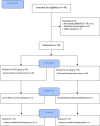Enhancing cognitive and physical performance in older adults through wearable sensor-based interactive cognitive-motor training: a randomized clinical trial
- PMID: 40437038
- PMCID: PMC12120118
- DOI: 10.1038/s41598-025-03725-x
Enhancing cognitive and physical performance in older adults through wearable sensor-based interactive cognitive-motor training: a randomized clinical trial
Abstract
Cognitive decline in older adults, often manifested as reduced processing speed and memory, represents a significant challenge to daily functioning and overall quality of life (QoL). Physical inactivity compounds these issues, whereas increased physical activity can lead to healthier cognitive aging. This study examines the impact of wearable sensor-based interactive cognitive-motor training (ICMT) on cognitive and physical performance in older adults. In a single-blind, randomized, parallel-group trial, 36 community-dwelling older adults aged 65 and older were divided into an ICMT and a cognitive training (CT) group. For six weeks, the ICMT group participated in cognitive training using the developed equipment, while the CT group participated in cognitive training using a seated tablet. The ICMT group demonstrated a significant improvement in cognitive function, increasing 1.94 ± 2.98 score (8.60% increase, p < 0.05), and enhanced balance and strength (p < 0.05). Hemodynamic responses of the prefrontal cortex showed a decreasing trend between groups. The ICMT group also demonstrated improved endurance in the 6-minute walk test, covering 18.00 ± 31.0 m more (4.65% farther) than the CT group (p < 0.05). These findings suggest that wearable sensor-based ICMT may offer a practical and effective method to improve cognitive and physical function in older adults, enhancing daily living activities and QoL. Moreover, the wearable sensor-based ICMT offers ease of use, portability, and the ability to conduct training in various settings without requiring specialized facilities, making it a promising method for older adults.
Keywords: Aged; Cognition; Cognitive training; Dual-task; Grip strength; Physical fitness; Wearable device.
© 2025. The Author(s).
Conflict of interest statement
Declarations. Competing interests: The authors declare no competing interests.
Figures



References
-
- Makino, K. et al. Relationship between instrumental activities of daily living performance and incidence of mild cognitive impairment among older adults: A 48-month follow-up study. Arch. Gerontol. Geriatr.88, 104034. 10.1016/j.archger.2020.104034 (2020). - PubMed
-
- Law, C. K., Lam, F. M. H., Chung, R. C. K. & Pang, M. Y. C. Physical exercise attenuates cognitive decline and reduces behavioural problems in people with mild cognitive impairment and dementia: a systematic review. J. Physiotherapy. 66, 9–18. 10.1016/j.jphys.2019.11.014 (2020). - PubMed
-
- Embon-Magal, S. et al. The effect of co-dependent (thinking in motion [TIM]) versus single-modality (CogniFit) interventions on cognition and gait among community-dwelling older adults with cognitive impairment: a randomized controlled study. BMC Geriatr.2210.1186/s12877-022-03403-x (2022). - PMC - PubMed
Publication types
MeSH terms
Grants and funding
LinkOut - more resources
Full Text Sources

